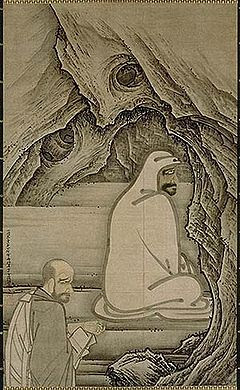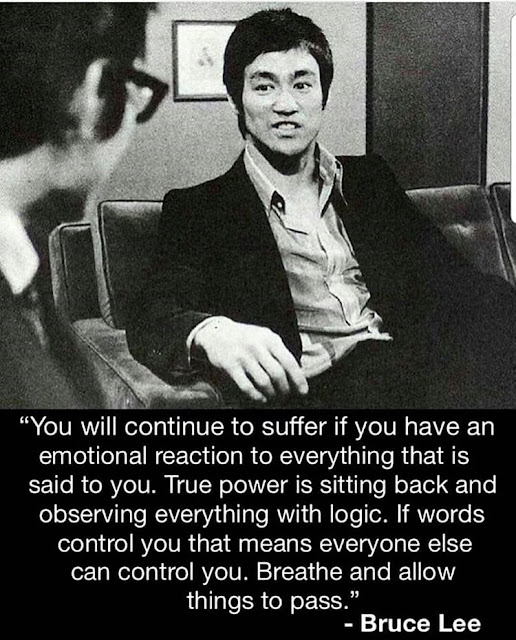Martial Arts and Anatta: Zen, Mindfulness, Bruce Lee
1. Why is Bruce Lee's Philosophy attached to Zen?
Zen
Zen (Chinese: 禪; pinyin: Chán; Korean: 선, translit. Seon) is a school of Mahayana Buddhism that originated in China during the Tang dynasty as Chan Buddhism. It was strongly influenced by Taoism and developed as a distinct school of Chinese Buddhism. From China, Chan Buddhism spread south to Vietnam which became Vietnamese Thiền, northeast to Korea and east to Japan, where it became known as Seon Buddhism and Japanese Zen, respectively.
The term Zen is derived from the Japanese pronunciation of the Middle Chinese word 禪 (Chan) which traces its roots to the Indian practice of Dhyāna ("meditation"). Zen emphasizes rigorous self-control, meditation-practice, insight into Buddha-nature, and the personal expression of this insight in daily life, especially for the benefit of others. As such, it de-emphasizes mere knowledge of sutras and doctrine and favors direct understanding through zazen and interaction with an accomplished teacher.
Huike Offering His Arm to Bodhidharma, Sesshū Tōyō (1496).
The teachings of Zen include various sources of Mahayana thought, especially Yogachara, the Tathāgatagarbha sūtras and the Huayan school, with their emphasis on Buddha-nature, totality, and the Bodhisattva-ideal. The Prajñāpāramitāliterature and, to a lesser extent, Madhyamaka have also been influential in the shaping of the "paradoxical language" of the Zen-tradition.
Anatta
In Buddhism, the term anattā (Pali) or anātman (Sanskrit) refers to the doctrine of "non-self", that there is no unchanging, permanent self, soul or essence in living beings. It is one of the seven beneficial perceptions in Buddhism, and along with Dukkha (suffering) and Anicca (impermanence), it is one of three Right Understandings about the three marks of existence.
Bruce Lee's Philosophy and Zen
"Zen" is actually shorthand for Zen Buddhism. According to the Random House Dictionary 2010, Zen is "…a Mahayana movement, introduced into China in the 6th century and into Japan in the 12th century, that emphasizes enlightenment for the student by the most direct possible means."
Martial arts skills along with Bruce Lee's martial arts ideology have started from Infinity (Zero). Every transformation of the Universe, naturally comes from Infinity (Zeno)
So, Bruce Lee's martial arts philosophy (TAO) can imagine like Zen, Mindfulness, Anatta, non-self.
According to me, fans of Bruce Lee have assigned his martial arts a Zen philosophy. Why? Because no language other than Zen and Mindfulness can tell Jeet Kune Do
You can leave comments on this view. We will discuss it together.
2. Some additional citations for Bruce Lee's Philosophy view attached to Zen, Mindfulness, Anatta
Bruce Lee Quotes
- Truth comes when your mind and heart are purged of all sense of striving and you are no longer trying to become somebody; it is there when the mind is very quiet, listening timelessly to everything.
- Effort within the mind further limits the mind, because effort implies struggle towards a goal and when you have a goal, a purpose, an end in view, you have placed a limit on the mind.
- Observe what is with undivided awareness.
- One does not accumulate but eliminate. It is not daily increase but daily decrease. The height of cultivation always runs to simplicity.
- A wise man can learn more from a foolish question than a fool can learn from a wise answer.
- To realize freedom the mind has to learn to look at life, which is a vast movement, without the bondage of time , for freedom lies beyond the field of consciousness care for watching, but don't stop and interpret "I am free," then you're living in a memory of something that has gone before.
- Only when the known ceases ‘that which is static, dead, and bounded’ can there be the possibility to live in the dynamic, alive, and boundless infinite realm of timelessness.
- True observation begins when devoid of set patterns; freedom of expression occurs when one is beyond system.
- The biggest adversary in our life is ourselves. We are what we are, in a sense, because of the dominating thoughts we allow to gather in our head. All concepts of self-improvement, all actions and paths we take, relate solely to our abstract image of ourselves. Life is limited only by how we really see ourselves and feel about our being. A great deal of pure self-knowledge and inner understanding allows us to lay an all-important foundation for the structure of our life from which we can perceive and take the right avenues.
- If you follow the classical pattern, you are understanding the routine, the tradition, the shadow -- you are not understanding yourself.
- Truth has no path. Truth is living and, therefore, changing. Awareness is without choice, without demand, without anxiety; in that state of mind, there is perception. To know oneself is to study oneself in action with another person. Awareness has no frontier; it is giving of your whole being, without exclusion.
- Conditioning obstructs our view of reality. We do not see IT in its suchness because of our indoctrination, crooked and twisted.
- The primary Reality is not what I think, but that I live, for those also live who do not think.
- How can there be methods and systems to arrive at something that is living? To that which is static, fixed, dead, there can be a way, a definite path, but not to that which is living. Do not reduce reality to a static thing and then invent methods to reach it. ...Truth has no path. Truth is living and, therefore, changing. It has no resting place, no form, no organized institution, no philosophy. When you see that, you will understand that this living thing is also what you are. You cannot express and be alive through static, put-together form, through stylized movement.
- The timeless moment. - The "moment" has no yesterday or tomorrow. It is not the result of thought and therefore has no time.
- Flow in the living moment. — We are always in a process of becoming and nothing is fixed. Have no rigid system in you, and you’ll be flexible to change with the ever changing. Open yourself and flow, my friend. Flow in the total openness of the living moment. If nothing within you stays rigid, outward things will disclose themselves. Moving, be like water. Still, be like a mirror. Respond like an echo.
- To express yourself in freedom, you must die to everything of yesterday. From the 'old', you derive security; from the 'new', you gain the flow.
Zen Philosophy - 7 Mindfulness Lessons from Bruce Lee
1.“Always be yourself, express yourself, have faith in yourself, do not go out and look for a successful personality and duplicate it.”
2.“To hell with circumstances, I create opportunities.”
3.“If you always put a limit on everything you do, physical or anything else, it will spread into your work and into your life. there are no limits. There are only plateaus, and you must not stay there, you must go beyond them.”
4.“It’s not the daily increase but the daily decrease. Hack away at the unessential.”
5.“One can function freely and totally if he is “beyond system.” The man who is really serious, with the urge to find out what truth is, has no style at all. He lives only in what is.”
6.“I’m not in this world to live up to your expectations, and you’re not in this world to live up to mine.”
7.“All fixed set patterns are incapable of adaptability or pliability. The truth is outside all fixed patterns. Empty your mind, be formless, shapeless like water. If you put water into a cup it becomes the cup. You put water into a bottle, it becomes the bottle. You put it in a teapot, it becomes the teapot. Water can flow or it can crash. Be water my friend.”
Learn more:






Post a Comment